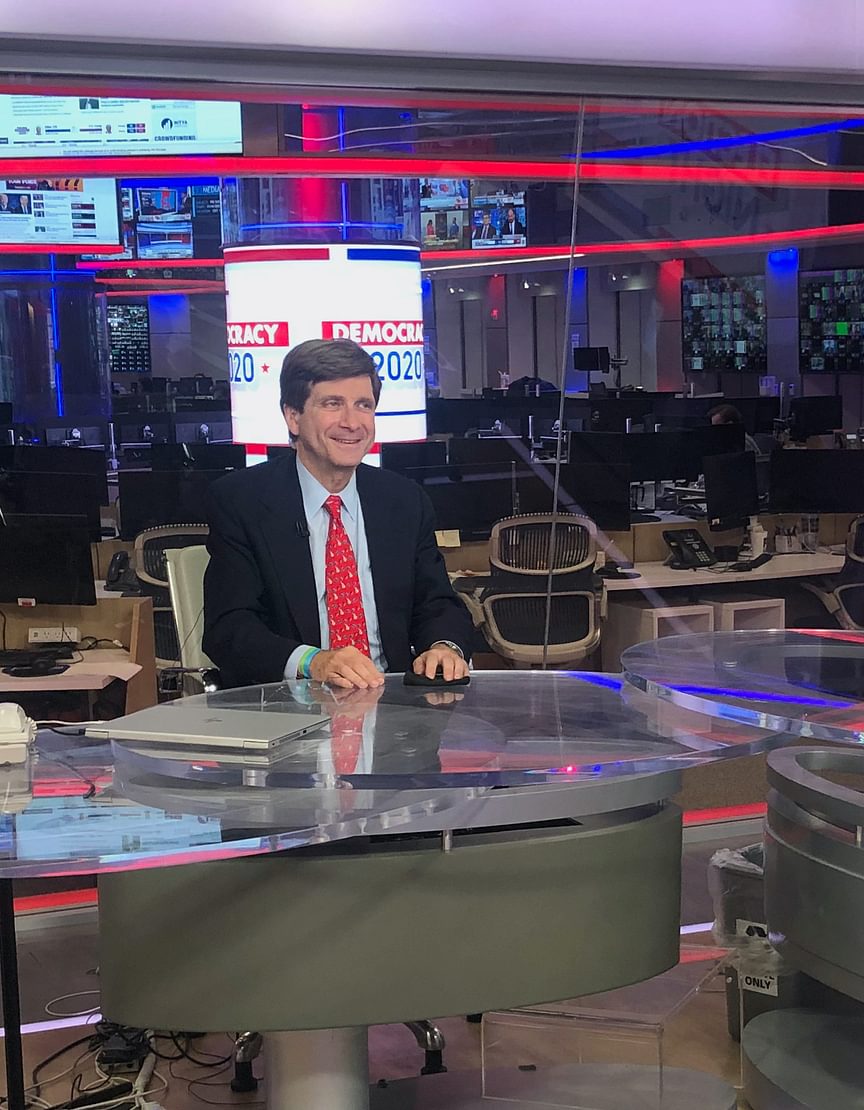
November 03, 2022
Let’s Discuss...
Political polling and life-changing lessons from PA with Arnon Mishkin ’72, Patrick Chen ’23, and Alex Shieh ’23Welcome to Andover magazine’s new series featuring conversations between members of the Andover community who share a common thread.
The time of the season felt right to kick things off with an alum and a couple of students who gather and analyze survey data of voters across America in order to present a clearer picture of public opinion and the status of political races. Mishkin, director of the Fox News decision desk—who first called Arizona for President Biden during the 2020 election—has led the network’s election night team since 2008, leveraging election day voter polling, sample precincts, and actual vote results to estimate results of all statewide and congressional contests. He also works as an independent strategy consultant and holds a BA in mathematics from Yale and an MBA from Harvard.
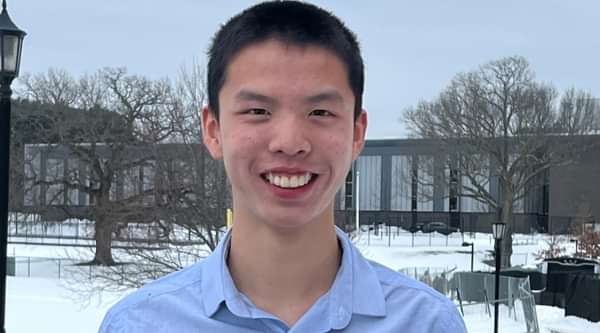 Patrick Chen ’23
Patrick Chen ’23
Executive Director Chen and Chief Pollster Shieh are cofounders of The Phillips Academy Poll, the nation’s first high-school-run public poll focused on polling the swing states. The students’ work tracking the electorate’s leanings through midterm races in November has garnered press coverage with Channel 7 News, New Hampshire Public Radio, and cited by Fox News, Politico, and FiveThirtyEight—to name a few!
Patrick: How did you find the industry?
Arnon: Well, I have always been interested in politics and I can thank the late Mr. [Thomas] Lyons for that, who was a longtime American history teacher [36 years at PA] and taught me American history senior year. The people in my class also fired up my interest including Bruce Poliquin ’72, P’10, who's now running for Congress again. He served from the second district in Maine. He and I were the leading argumentative people in Mr. Lyons's history class, but I would say that's the class that made me fall in love with American politics and I have been involved in politics more or less ever since. I worked for a time with one of the big democratic political consulting firms, and then with a management consulting firm, but have always been involved in polling. I was at NBC News for a while and have been at Fox for over 20 years, working on their election night operation, which is mainly decision desk and polling operation to assess how voters behave. But back when I was a political consultant, we used polling to figure out not how voters have behaved, but rather to try and affect that behavior and then identify ways that could affect their behavior using issues.
Alex: Speaking of polls, people often get mad at and dismiss the polls. We saw this in the last few presidential elections. What’s your take on this?
Arnon: The problem is, I think, we measure polls by how exact they are but in reality, polls are not exact. They're inexact instruments. They're blunt instruments to assess trends, to assess issues, but not to make point estimates of what the difference in the results are going to be. I think that we try to get polls to do more than they can do, and I think that what they can do—what they're very effective at—is assessing how strong the support is that different candidates have, and how much various issues are affecting one way or the other. But I think a lot of what we've seen go wrong with polling in the past few election cycles has been partly about people not reading them right.
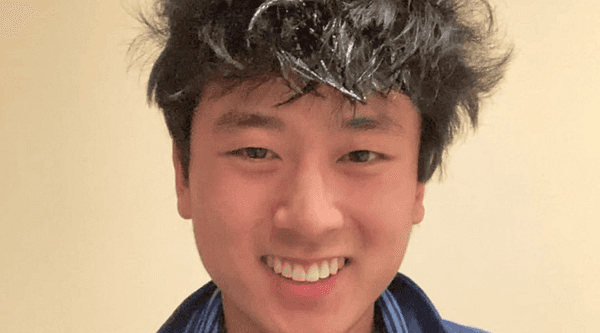 Alex Shieh ’23
Alex Shieh ’23
For instance, in 2016 I think we all saw polling that showed that Hillary Clinton was ahead of Donald Trump, and we focused on the difference between the two candidates. But I remember looking at the polling after Trump had gone through two weeks of being battered by the press over one controversy after another, and I said, ‘Wait a second, there's something wrong with these pictures. He's declining, but she's not gaining, she's staying steady at 43, 44 percent. That's not a good sign for her. That means that people might be getting disappointed in Donald Trump, but they still have not signed on to Hillary Clinton, and that's a bad sign for her.’ Then that proved to be the correct way to read those polls.
I think in 2020, the polls continued to underestimate Donald Trump's support—how much it was—and I think if we look back, I would argue that many of those people who said they were undecided...My theory is that they were basically a Trump vote.
Alex: There are a lot of swing states and we’re polling them (visit andoverpoll.com), but Georgia, Nevada, Arizona, Pennsylvania—a lot of these states are looking very close. What’s your prediction for November as of today [Sept. 23]?
Arnon: I think we’re going to see an election that is going to fall pretty much on partisan lines, and there’s a pretty even split right now between Democratic and Republican voters…which probably means it may take a couple of days to figure out who’s in control of the Senate or the House for that matter—but it also means that the Republicans have a pretty good chance given they only need to win five seats to win the House. The Democrats have a chance, but I’d say it’s also a pretty close chance that they may be able to hold onto the Senate.
Patrick: Is there anything that you think will surprise us this year?
Arnon: I think that the electorate is still changing. I think that over the summer, the Republicans could not catch a break. Everything went the Democrats’ way. The Democrats managed to pass the CHIPS bill. They passed a climate change bill that they call the Infrastructure Reduction Act, but it's a climate change bill, that no one thought they were going to be able to pass. The inflation numbers were abating for much of the summer. Gas prices were declining at a time when you'd expect them to be going up. The abortion issue was solidifying in the minds of voters in a way that was beneficial to the Democrats. I think that what you saw as a result was the Democrats doing a lot better in the polling.
But we should also not eliminate the possibility that things are going to change between now and November. The biggest changes are that we have a situation in Ukraine. Foreign policy rarely affects domestic issues, but somehow this thing might get big enough that it could have a major impact. It could have an impact on gas prices and grain prices, obviously, and I think that we'll have to wait and see how things are changing, but don't assume that you know how the voters are going to react in November.
The Democrats have a chance, but I’d say it’s also a pretty close chance that they may be able to hold onto the Senate.
”Alex: In your data models, how do you project what the voter turnout is going to be between these different demographic groups?
Arnon: I think that this is a long-standing impact of actually two candidates—of two people. First is Barack Obama. I think one of the things that Obama did was he really caused the registration of significant numbers of African American voters. They clearly showed up in big numbers in 2008, which is one of the reasons Obama did so well in 2008, but everyone assumed that wasn't going to be the long term. One of the reasons the Republicans thought Romney had a really good chance was because they thought that the turnout amongst the African American community wasn't going to be that solid, but they turned out again in 2012.
The second person who's done a great deal for American voting is Donald Trump. I think that he really did create enormous turnout amongst both Democrats and Republicans.
In 2016, it was particularly amongst Republicans. In 2018 and 2020, it was really amongst the Democrats as well. I think it's one of the reasons the Democrats won because—they weren’t just turning out for Joe Biden—they were turning out against Donald Trump.
I think we’re going to see this time around that voters are as engaged as ever, that the impact of the Trump candidacy is going to result in continued attention on politics and continued interest in voting.
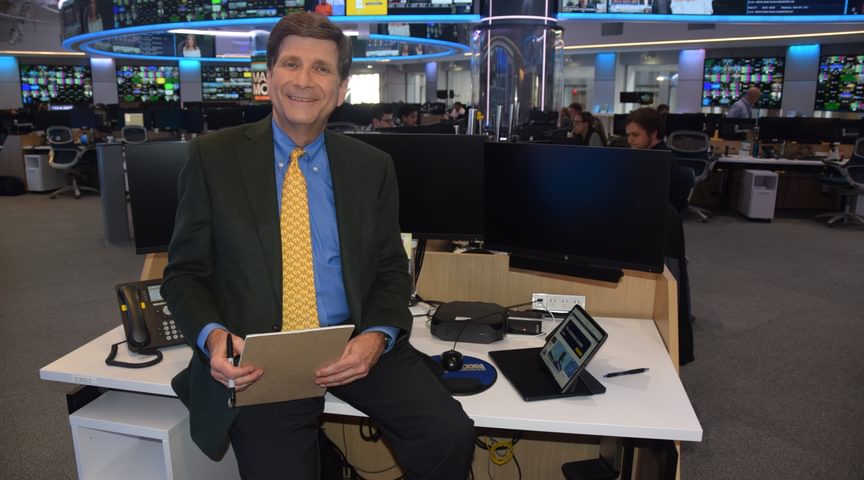
Alex: What do you think is the biggest lesson that you’ve learned from your years in politics?
Arnon: Voters matter and voters don't always behave the way you think they're going to behave. That was the lesson in 2016, when I think everyone in the media particularly thought there's no way Donald Trump is going to win, and it turned out he did win.
Patrick: Our polling project wouldn’t have been possible without the support of Dr. [Nick] Zufelt [computer science and mathematics], our advisor. You talked about your history teacher, Mr. Lyons, who are some of the other people who influenced you at Andover—and what was the biggest lesson you’ve learned from PA that still benefits you today?
Arnon: Problem-solving. I remember the first day upper year, asking someone, ‘How are you supposed to do this thing?’ And the person looked at me and said, ‘They just want you to think.’ It sounds unremarkable but in retrospect, it was a very important lesson—one that I took away from Andover. Tom Regan, who was an English teacher—and another faculty legend—also was a key influence. I had him for satire and credit him for teaching me how to write. Then finally, Mr. Ted Hammond, who I had for Math 55, which was what we had after calculus. He taught me a lot about mapping. He would go up to the chalkboard and start writing, “Logic is the hygiene a mathematician uses to keep his ideas clean and strong.” Fifty-two years later, I still remember it.
Alex: Do you have any advice for us as pollsters or just as Andover students in general?
Arnon: I’m going to sound like a real old Blue here, but yeah. When I was on campus at Reunion in June, walking past Bartlett and Paul Revere and Sam Phil, I just had this feeling of, ‘Do these kids know how blessed they are?’ And I don’t just think that you’re blessed. This education is a gift that you should try to figure out how to use. It’s great that you guys are getting into polling because it’s an industry, despite all the challenges, that is going to remain important not just for the perspective of politics, but for the perspective of all types of business.
Other Stories
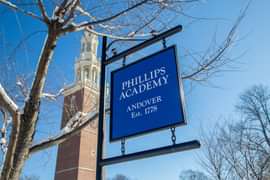
Andover’s 10th conference promotes open financial dialogue




